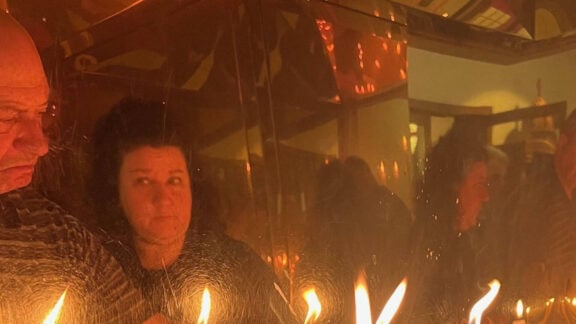Joel Christensen, Professor of Classical Studies at Brandeis University and a regular contributor to Neos Kosmos, will soon become Provost and Senior Vice President for Academic Affairs at the City University of New York (CUNY) Graduate Center.
Prof. Christensen is also the Senior Associate Provost for Faculty Affairs at Brandeis, and his research spans Homeric poetry, literary theory, narrative traditions, and performance.
A career bridging research and leadership
In addition to publishing on language, myth, and literature in the Homeric epics, Christensen has authored or edited six books, including two monographs: Storylife: On Epic, Narrative, and Living Things (2020) and The Many-Minded Man: The “Odyssey,” Psychology, and the Therapy of Epic (2018).
CUNY Graduate Center President Joshua C. Brumberg praised Christensen’s appointment; “Joel Christensen brings an impressive record of achievement and a fresh perspective to our unique public graduate school.”
Brumberg told CUNY media that Christensen rose “through the ranks at Brandeis to become a faculty advocate and a leader who steers innovation.”
Currently, at Brandeis, Christensen oversees faculty hiring, promotion, and development across the university’s schools, which enrol more than 3,600 undergraduate and 1,500 graduate students.
He joined the Brandeis in 2016 from the University of Texas at San Antonio and became a full professor in 2021. In 2013, as a fellow at the Center for Hellenic Studies, he received a Society for Classical Studies Award for Excellence in Teaching at the Collegiate Level.
His public writing includes op-eds in Inside Higher Ed, blog posts, and Painful Signs, his Substack on the Iliad and of course Neos Kosmos.

Homer, the humanities, and a mission under threat
Christensen will work with Brumberg to enhance the Graduate Center’s standing and increase its impact “as a research-driven institution that changes lives and advances the public good.” Speaking to Neos Kosmos, he said, “It was humbling to be offered this role.
Often, when people talk about leadership, they think in terms of accolades and honours. But for me this is also about responsibility and duty, words that tend to ring a little old-fashioned in modern conversations.”
He pointed to the complex challenges many U.S. universities now face—from financial strain to political pressure and technological disruption.
“Our missions of preserving, transmitting, and creating knowledge are under duress.”
Channeling Odysseus, one of Homer’s most complex heroes, Christensen described the task ahead as a one pf navigating dangerous waters.
“Deans, presidents, and provosts navigate the institutions in unpredictable and dangerous waters. I recognise the challenges ahead and the faith a lot of people are putting in me to support the institution’s mission of championing knowledge as a public good and safeguarding the principles of shared governance and academic freedom that make this mission possible.”
Christensen said he remains deeply invested in how stories shape human behaviour.
“I’m interested in how stories and literature shape the way we act in the world—and I really am still there.”
He studied ancient literature to understand the aesthetic and narrative traditions that influenced his favourite modern writers.
“At each step along the way, there was something more to learn—language, history, philosophy, linguistics in the beginning, and over time linguistics, literary theory, psychology.”
Christensen first taught Latin to high school students as an undergraduate and found the classroom “a sanctuary of sorts.” Graduate school, he said, was a way to “keep learning” and to prepare to teach more.
“I did both along the way and have found my studies to always be a good resource inside the classroom and without.”
His move toward administration was gradual.
“It came in part from learning how to support and grow programs studying the ancient world and then shifted as I realised that I could do more outside of the classroom to ensure that talented teachers and researchers would be able to continue to do the work within.”

Ancient narratives, modern responsibilities
While classics may be diminishing especially within Anglosphere universities, the ancient world remains alive in contemporary and popular culture. Tom Holland’s translation of Suetonius’ The Lives of the Caesars for example has become a bestseller, YouTube ancient history channels have millions of viewers, television docudramas such as Roman Empire (2016) still rates high on Netflix, and there are Broadway musicals on Persephone and Hades.
“The irony is that antiquity is a multi-billion-dollar motion picture, novel, and video game business, yet the study of the past at the university level is in its most tenuous place ever,” laughed Christensen
“Greece and Rome maintain their attraction in part because of their heightened cultural position—there’s a bit of propaganda there but it can’t just be that.
“The version of the past that we see in the novels of Madeline Miller who wrote the best selling The Song of Achilles, Ridley Scott’s Gladiator, and Uberto Pasolini’s recent film based on the Odyssey, The Return are fantasies.
“We are constantly rewriting and reconsidering our inheritance.”
“Part of this is that the grand scenes of ancient war and amphitheatres spark the imagination—it is familiar enough that we understand it but strange enough that it can be altered and dangerous without being threatening.”
Prof. Christensen noted that our relationship to ancient tales is similar to how ancient audiences responded to the Iliad and Odyssey.
“With each new version of ancient tales, we are retelling where we came from, trying to reframe the past and our stories in a way that resonates with the present, and through both processes trying to figure out who we are, or who we can be.”
“The past is a marvellous vehicle for drawing new paths through the present,” he said.
“Therefore, the arts that help us study the past are some of the first that authoritarian regimes try to control,” he added, referencing attempts by the Trump administration to restrict universities.
Sharing the Ancient World with the modern Greek Diaspora
Christensen is a committed supporter of academic-public engagement and a regular contributor to Neos Kosmos, where he used antiquity to reflect on modern issues, such as the war in Ukraine, the Trump administration or fires in Greece.
“Academics contributing to publications like Neos Kosmos ought to be one of the most fundamental roles of the modern academy,” he said.
“The ideas that spark, inform, and drive our research must not stay confined to academia—we need to bring them into public conversation.
“It is a great thing to write about ancient Greek narratives in a modern Greek diaspora publication like Neos Kosmos from the other side of the world,” Prof. Christensen said.
He said that he is committed to ensuring people outside academia understand the value of the work universities support.
“We [in academia] can learn from the experiences and wisdom of people who come to our work from other perspectives.”
With his appointment at the CUNY Graduate Center, Prof. Joel Christensen brings scholarly rigour and academic leadership, and a belief in the power of ancient stories—and modern scholarship—to change how we live now.








